Related Articles
Related Articles
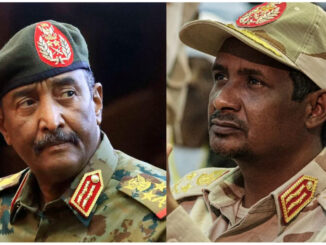
As Sudan’s Army and Rapid Support Forces Battle, Sudanese Left Calls for Restoring the Revolution
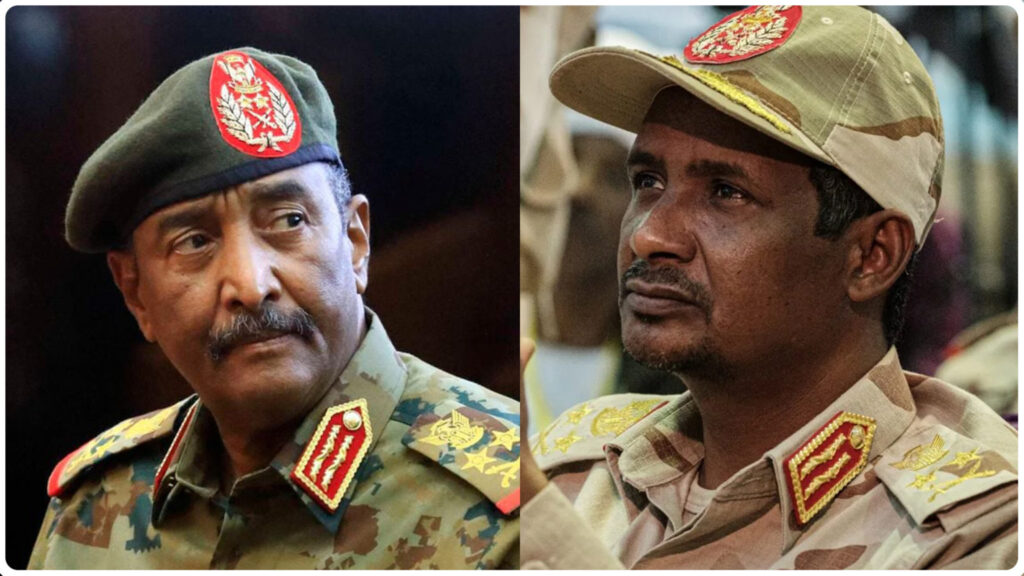
Editor’s Note: This article was originally published by Peoples Dispatch.
Tensions simmering between Sudan’s army and the powerful paramilitary Rapid Support Forces (RSF) boiled over into armed clashes on the morning of Saturday, April 15, following disagreements over the integration of the autonomous RSF into the army’s command chain.
The issue of integration was a key aspect of a deal that Sudan’s ruling junta was to sign with right-wing civilian forces to share power with the latter. The left in Sudan has been critical of the proposed deal, questioning the sincerity of the parties. Speaking to Peoples Dispatch a few hours before the fighting broke out, the Sudanese Communist Party’s Foreign Relations Secretary, Saleh Mahmoud, said “Both the forces, the army and the RSF, have a mutual interest in escalating armed conflict, so that it can be used as a reason to not hand over power to the civilian forces.”
According to the Sudanese Armed Forces (SAF), the air force carried out strikes destroying RSF’s Tiba and Soba base in Khartoum State on Saturday. Heavy gunfire began in the morning in several cities, including in the vicinity of the Presidential Palace and the airport in the capital Khartoum city.
Earlier, the RSF, which is led by the ruling military junta’s deputy chairman, General Mohamed Hamdan Dagalo, aka Hemeti, claimed to have taken control of the Presidential Palace, the seat of the junta’s chairman and army chief, General Abdel Fattah al Burhan.
Later, however, after continued fighting, the SAF claimed that the RSF troops had left their weapons behind and fled the the presidential palace area to hide in the residential areas. The army has called on the residents to stay home.
The RSF had also claimed to have taken control of the airports in Khartoum and in El-Obeid, over 400 km southwest of Khartoum in the state of North Kordofan. It also claimed control over the military airbase in Merowe, 200 km to Khartoum’s north, in the Northern State which borders Egypt.
While Hemeti is backed by the UAE, Egypt, which is said to be backing Burhan in this internal struggle, reportedly has planes in this airbase, making it a crucial infrastructure.
On April 12, at least a hundred RSF vehicles surrounded this airbase. Sudan Tribune reported that “the army surrounded the RSF troops and requested them to evacuate but the paramilitary force refused.” Subsequently, military vehicles of the RSF also rolled into Khartoum and several other cities.
Complaining that “this deployment and repositioning” of the RSF “clearly violates the law,” the SAF spokesperson issued a statement at 3 a.m. on Thursday, warning that the “continuation” of such deployments “will inevitably cause more divisions and tensions that may lead to the collapse of security in the country.”
According to the RSF, which first issued a statement on the fighting, clashes began after a surprise attack by the army on its troops in Soba, before simultaneous attacks on its bases in several other cities. The SAF has in turn accused the RSF of lying to conceal its own aggression.
RSF and the Army Worked Together to Protect Military Rule from Pro-Democracy Movement
Established in 2013, the RSF was formed by coalescing the various militias used by the state during the civil war in Darfur in the 2000s to commit alleged war crimes, crimes against humanity, and genocide.
Omar al-Bashir, the former dictator under whose administration these alleged crimes were committed, stands trial at the International Criminal Court (ICC). He was forced out of power on April 11, 2019, about four months after the start of the pro-democracy protests that have come to be known as the December Revolution.
By the time of his ouster, the RSF had become, and remains, one of the most powerful organizations in the country with a vast financial network built on mining gold in Darfur. Hemeti had pledged over a billion dollars to help stabilize Sudan’s central bank in the aftermath of Bashir’s removal.
Such increasing power and influence of the RSF have been making the army uneasy over the years. Reports about underlying tensions between the Burhan and Hemeti have been frequent. However, united with the intent to maintain military rule and protect it from the December Revolution, the two forces had been working together.
The junta formed by the generals in Bashir’s security committee after his removal was chaired by army chief Burhan, who in turn declared RSF head Hemeti his deputy on April 12, 2019, exactly four years before he would deploy the RSF to surround Merowe military airbase.
When the mass sit-in demonstration occupying the square outside the army HQ continued after Bashir’s removal, insisting on a civilian administration, the junta deployed the RSF on June 3, 2019. In the massacre that followed, RSF troops killed over a hundred protesters, wounding many more and raping several while the army watched over from its HQ.
Right-Wing Parties Seek Compromise with the Military Junta, Again
In the aftermath of this massacre, right-wing parties in the coalition, Forces of Freedom and Change (FFC), entered into negotiations with the junta, forming a joint civilian-military transitional government in August 2019. In protest against this compromise, the Sudanese Communist Party (SCP), a key player in the December Revolution, broke away from the FFC, which was formed in January that year to represent the pro-democracy protest movement.
Under this power-sharing arrangement with the FFC, the military controlled the defense, the police, the foreign policy, and much of Sudan’s economy. The little power that was ceded to the FFC-chosen civilians in this government was taken back with the military coup in October 2021, since when military rule has been absolute.
“No negotiations, No Compromise, No partnership” with the military, is a slogan that has been resonating in the mass-protests that have continued since the coup, regularly drawing hundreds of thousands to the streets in several towns and cities across the country.
Disregarding this popular call for the complete overthrow of the junta and the prosecution of its generals under a fully civilian transitional government, the FFC returned right back to negotiations after the coup, seeking a compromise and partnership with the military again.
The unpopular negotiations were supported by the Trilateral Mechanism, formed by the United Nations Integrated Transition Assistance Mission in Sudan (UNITAMS), African Union (AU), and the seven-countries regional bloc, Intergovernmental Authority on Development (IGAD).
The United States threw its weight behind these negotiations, imposing pressure on the military as well as the right-wing FFC parties to make compromises and come to another power-sharing agreement.
Egypt and Saudi Arabia, which are backing Burhan, and the UAE, which is backing Hemeti, all want a military regime in Sudan, albeit with different hierarchical structures, Fathi Elfadl, national spokesperson of the SCP, told Peoples Dispatch.
“But the Americans,” he added, “have been pushing for a comprehensive agreement with the FFC to establish a civilian authority, which, however, will only serve as a cover for the real authority that will be invested in the Security and Defense Council controlled by the junta.”
Under much Western pressure and growing threats to their authority from the radical mass-movements below, the junta and the FFC signed a Framework Agreement in December 2022, laying the path toward a final political agreement on another power-sharing arrangement.
By then, at least 120 had been killed and thousands injured in the crackdown on pro-democracy protests by the army, the police, and the RSF. Yet, unwilling to compromise with the military, the network of over 5,000 local Resistance Committees (RCs) across Sudan, which have been leading the mass-protests since the coup, rejected the agreement, and vowed to continue mass-actions till the junta is toppled.
Hundreds of more protesters have since suffered injuries in the crackdown that has continued despite the junta’s commitment in the Framework agreement to respect “international human rights charters.. freedoms of peaceful assembly and expression”.
While the agreement stated that a civilian Prime Minister will be the supreme commander of the armed forces, Burhan clarified to media only days later that the “civilian Supreme Commander of the SAF” neither “presides over the army chief” nor appoints him, but “only approves recommendations made to him.”
Despite these demonstrations of bad faith, the FFC proceeded under the aegis of the trilateral mechanism to negotiate the contested issues left unresolved in the framework agreement.
These included the review of the Juba peace agreement which has brought no peace to the war-torn regions like Blue Nile and Darfur where hundreds of thousands have been displaced since in continuing armed attacks, mostly by the RSF and the militias it supports. Another contested issue was the nature of transitional justice for the victims of the June 3 massacre and other atrocities.
With several compromises, the FFC had found common ground with the junta on most of these issues by last month when the signatories of the framework agreement announced that the final political agreement will be signed by April 1. This was to be followed by a constitutional declaration on April 6, and finally, the establishment of the new joint transitional government by April 11, the anniversary of the overthrow of Bashir.
‘Only Way Out of the Crisis Is to Restore the Revolution’
However, on April 1, the signing of the political agreement was postponed to April 6, and then indefinitely delayed. The FFC said that the delay was caused due to a disagreement between the army and the RSF over the integration of the latter into the former’s structure.
While Burhan is insisting that the integration should take place within the two years of the transitional period by the end of which an election is to be held as per the agreement, Hemeti has refused, demanding 10 years.
“By lining up with the RSF in this dispute, the FFC has lost the little credibility they may have been left with after entering into negotiations with the junta for the second time,” SCP’s Foreign Relations Secretary, Saleh Mahmoud, told Peoples Dispatch.
While the FFC has denied the allegation, Middle East Eye reported that according to a draft of the final agreement it has seen, a period of 10 years had been agreed upon for this process of integration. Given that the FFC claims that it is only the disagreement within the security forces that is impeding the final agreement, the provision of 10 years in the draft might be an indication of the FFC’s willingness to allow the notorious paramilitary another decade of autonomy.
One explanation for the alleged siding of the FFC with the RSF is that the RSF agrees with the FFC that parties that have not signed the framework agreement should not be a part of the political agreement or have a share in state power. Burhan, however, has shown his keenness to also include other parties outside the framework agreement, especially those who had been in alliance with the ousted Bashir’s Islamist National Congress Party (NCP).
With the escalation of hostilities, however, the prospect of a final political agreement on the basis of the framework agreement has practically fallen apart, argued Mahmoud.
SCP reiterated in its statement that “the only way to get out of the crisis is to restore the revolution and establish the authority of the people.”
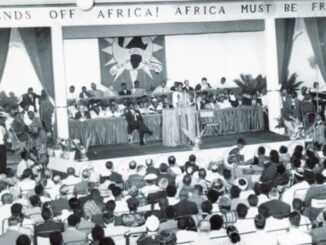
Unity Is an Imperative: Reclaiming African Liberation Day, 60 Years On
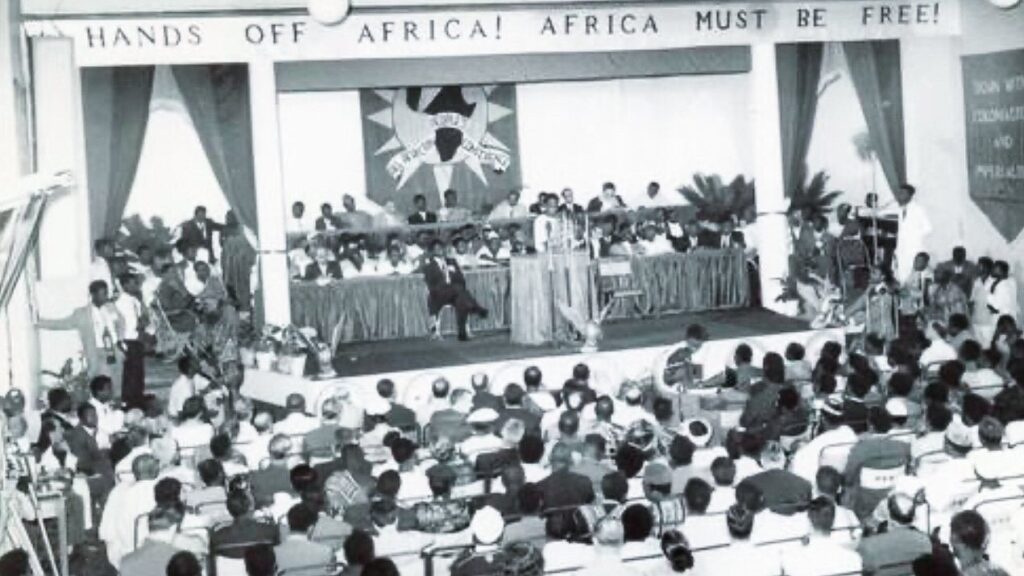
This article originally appeared in Peoples Dispatch.
Sixty years ago, on May 25, Ghana’s first prime minister and president, the anti-colonial revolutionary leader Kwame Nkrumah stood before 31 other heads of African states in the Ethiopian capital of Addis Ababa and declared, “[T]he struggle against colonialism does not end with the attainment of national independence.”
“Independence is only the prelude to a new and more involved struggle for the right to conduct our own economic and social affairs…unhampered by crushing and humiliating neo-colonialist controls and interference.”
“We must unite or perish,” Nkrumah had emphasized, recognizing that while countries across the African continent were “throwing off the yoke of colonialism,” these successes were “equally matched by an intense effort on the part of imperialism to continue the exploitation of our resources by creating divisions among us.”
Nkrumah was speaking at the founding of the Organization of African Unity (OAU) in 1963, striving, alongside other leaders, to build a Pan-Africanist vision of a continent united under a common currency, monetary zone, and central bank, and a united government and joint defense under an African High Command.
That these conditions did not materialize speaks to imperialism’s “intense effort” to suppress this vision. The coming decades would see African leaders assassinated and overthrown in coups backed by colonial powers for daring to envision a life of dignity for their people. Meanwhile, international financial institutions, dominated by these very forces, implemented brutal regimes of structural adjustment, sinking African countries further into debt and exploitation.
While the OAU eventually became the African Union (AU) and the African Liberation Day became Africa Day, May 25 still serves as a crucial day for progressive forces to connect the struggles for national liberation and Pan-Africanism of the 20th century to the present struggles against imperialism.
On this theme, Pan African Television hosted a discussion titled, “African Liberation Day: The State of the Struggle for Freedom” on May 25.
Recovering the History of Collective Liberation
The general secretary of the Socialist Movement of Ghana (SMG), Kwesi Pratt Jnr. added, “The national liberation struggle is not over…even if that struggle was over… what about the ownership and exploitation of our resources for the sole purpose of enriching the bank accounts of the multinational corporations in the colonial metropolis?”
“The radical nature of this celebration [of African Liberation Day] is saying that we as African people came together to end exploitation…end colonialism…to continue to strive for stopping neocolonialism from taking its root on the African continent. That struggle is still ongoing,” said Kambale Musavuli, a leading activist and an analyst with the Center for Research on the Congo-Kinshasa.
“In some parts of the African continent, people still do not have independence…The people of Western Sahara are still under colonialism by Morocco. We have to make sure that they are liberated.”
African Liberation Day also recognizes that people across Africa threw off the yoke of imperialism through collective struggles. Dr. Vashna Jagarnath, a labor activist and director of Pan Africa Today, commented. “We all know the struggles we face 60 years later, we have been recolonized in different ways, through the debt crisis, through foreign policy, through military bases being allowed to be built on our continent and determining to us who it is we can have relationships with, that determine our local policy…”
“Our continent is in a crisis. So we need to recall our history of us liberating ourselves.”
The Addis Ababa meeting of 1963 had been decades in the making, preceded by the Pan-African Congress held in Manchester, UK, in 1945 and the All-African People’s Conference in Ghana in 1958. However, these initiatives were also built on hundreds of years of struggle by the African people for freedom, “a part of the long march” from the days of the transatlantic slave trade, Pratt stressed.
This long history of liberation struggles and their collectivist orientation is not widely known by young people across Africa today, Musavuli said, calling this an “erasure of history.”
In reality, collectivism had closely informed the period of the struggle for independence for the DRC, and this took various forms—including the support provided by other African countries like the Central African Republic to the DRC. We must remember the fact that Pan-African activist T. Ras Makonnen had helped to get Patrice Lumumba to Ghana in 1958 and how the Mau Mau had gone from village to village in the country and screened films in 1960, Musavuli highlighted.
“The independence of Congo was not a national affair, it was a continental affair…We cannot talk about June 30 as Congolese independence, it was a Pan Africanist independence,” he said, reiterating the need for unity and a “Pan Africanism of the people.”
Internationalist Oppression, Internationalist Resistance
Speaking to the historic erasure of these links in the context of South African exceptionalism, Jagarnath said, “You are taught about the South African economy as if it is divorced from the rest of Africa, as if South Africa, which is a resource-rich country, is rich on its own, as if it was not migrant labor workers from Mozambique, Zimbabwe, and Malawi working in our mines, without getting any compensation, to enrich the elites of our country.”
Even today, “for the South African capitalists who are exploiting and benefiting from Ghana… Why must they worry about the liberation of Ghanaians? They don’t need to tell Africans the role of Ghana in the history of our liberation… That is a dangerous story that will affect their profits.”
At a time when African Liberation Day is barely celebrated on the continent, including in Nkrumah’s own country of Ghana, Jagarnath noted that the reason was because the “political project had changed”.
“We as people give up our power to those in power and we let them dictate to us, and they change, and the changes that come into place are economic and political…they do not want us to be liberatory because if we have liberatory policies…if we remember the liberatory aspects of our history we will try to liberate ourselves from them, and this is not convenient because they are now making deals with each other to continue to exploit this continent.”
“So we have two sets of exploitation: the classical imperial exploitation that still comes from the imperial nations, but we also have our internal systems.”
It is this very nature of exploitation that determines that the form of struggle must be internationalist: “The struggle for national liberation in Africa has always been an internationalist effort,” Pratt said. He elaborated that this was due to the fact that the very division of Africa had been an internationalist effort, namely the Berlin Conference of 1884-1885, when colonial powers partitioned the African continent among themselves for the purposes of extraction and exploitation.
“Our enemies are united, and we have no chance of succeeding against that united force if we [ourselves] refuse to unite,” he said. There is a rich history of this internationalist unity, not just within the continent. Cuban revolutionary Che Guevara set up a camp in Ghana to train fighters who were engaged in parts of Eastern Africa and South Africa. The internationalist unity was also reflected in Cuba’s armed support in the fight against apartheid and the consolidation of the independence of Angola and Namibia, Pratt added.
We can also see this in the connected struggles for Black liberation in the United States and the liberation against imperialist oppressors on the African continent, stated panelist Makayla Marie, a member of the Party for Socialism and Liberation in the United States.
Internationalism remains a necessity today, the panel discussion emphasized, “You cannot support the independence of the Sahrawi Arab Democratic Republic without supporting the struggle of the Palestinian people for national independence against apartheid colonial occupation,” Pratt added.
“What we are fighting is the scourge of capitalism in its worst forms, at this imperialist stage, and we need to unite as African people…as socialists…as revolutionaries to achieve victory, which is inevitable.”
This was also underscored by Musavuli in the case of the Democratic Republic of Congo (DRC), where “it is not just imperialists but also other African countries, who are exploiting the country … They are only able to do it because they see the DRC as separate. They do not see us united in the struggle.”
These issues inevitably lead to a key issue that the panelists addressed—that of a general crisis of political legitimacy of current governments and of the use of divisive politics which worked to obscure the common reality “that we are all oppressed by the same oppressor,” as Marie said.
“People, be it in the U.S. or the African continent, have a difficulty right now choosing their leaders, and they must unite and challenge the forces that be,” Musavuli stated. This necessitates the need for mass-based and mass-led collective struggles for a “true independence,” the panelists reiterated.
“These Western countries after colonizing us, enslaving us, and stealing our resources, are now coming back to us and telling us that if we want to develop, we have to be like them and follow the capitalist path to development. That path started from slavery, passed through classical colonialism, and has today arrived at neocolonialism,” Pratt said.
“We have arrived at a situation in history where the only viable option available to us is the self-reliant path to development, the ownership of our resources for our own development… and that option inevitably leads us to the path of socialism.”
“Socialism is the only path to liberation from exploitation, from oppression, from poverty.”
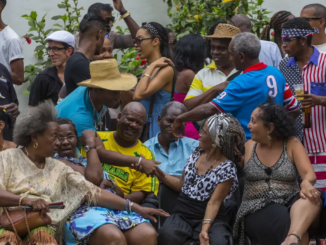
‘Anti-Black’ Claim Raised About Cuba As Solidarity Activists Stopped at U.S. Border & Black Socialists Arraigned in United States for Collaborating with Russia
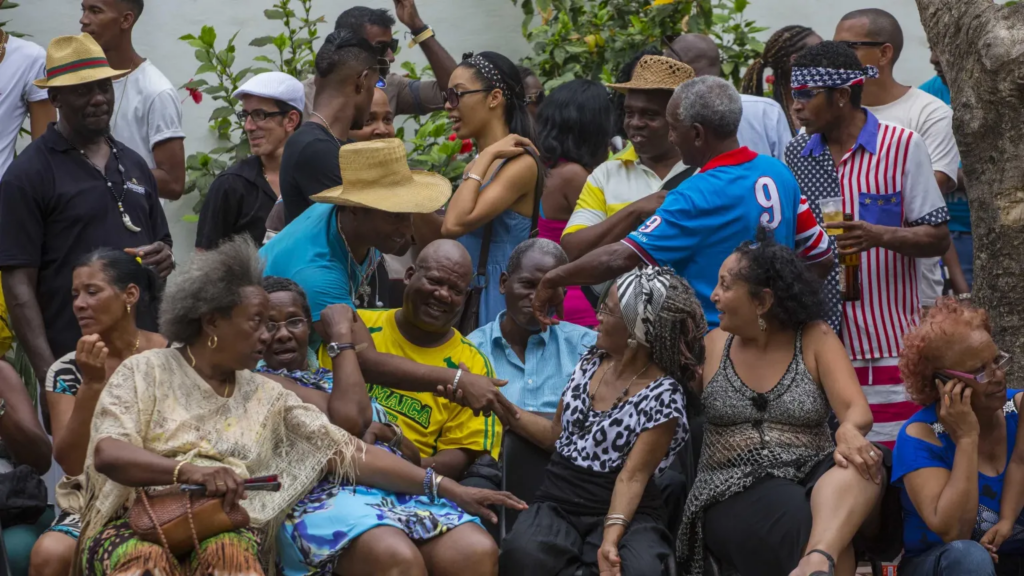
A 2-year-old argument about “anti-Blackness” in Cuba, which Black solidarity activists in the United States say has no basis in reality, has reared its head.
It appeared in a video posted on Twitter on May 1 that has since gone viral, generating more than 2 million views in four days. The video features Afro-Cuban Grecia Ordoñez, who claims Cuban Revolution leaders Fidel Castro and Ernesto “Che” Guevara were racists who engaged in “white saviorism.” She also claimed genocide was committed in the Democratic Republic of Congo during the time Cuba’s revolutionary government intervened to support rebels fighting the DRC government put in place after revolutionary leader and first Prime Minister Patrice Lumumba was assassinated in 1961. Further, she pointed to Afro-Cubans being detained in Cuba as an example of racism.
A message to black Americans from Cubans regarding Che Guevara and Fidel Castro. #Cuba🇨🇺 pic.twitter.com/kHCDnBaE6H
— Martha Bueno (@BuenoForMiami) May 1, 2023
Activists debunked her claims on Twitter, including a thread of articles and videos featuring members of anti-imperialist group Black Alliance for Peace.
For 2 years, the “anti-Blackness” claim has allowed "human rights" narratives to form around revolutionary states in the crosshairs of the U.S. empire. This video comes on the heels of one of the largest U.S. youth delegations to visit #Cuba (@PeoplesForumNYC). Here's a thread 🧵 https://t.co/oV3AhE9V0u
— Black Alliance for Peace (@Blacks4Peace) May 4, 2023
The thread included the following articles and videos:
- Hood Communist Guide to the U.S. Blockade
- Limits of Lived Experience by Erica Caines
- Out of The Clouds: Remarks on Anti- Blackness In Cuba by Salifu Mack
- Witnessing Afro Cubans and Social Change by Austin Cole
- An African Palenque: Cuba And Global Black Solidarity by Kimberly Monroe
- African Power and Politics In Cuba’s La Marina Neighborhood by Musa Springer
- Ajamu Baraka on Cuban Protests
- Afro-Cubans Against Cuba
- Black Alliance For Peace x Belly of The Beast Screening Event
- James Early and Musa Springer on Cuba, Socialism and Race
- Black August and The Cuban Revolution
While Ordoñez doesn’t point to evidence for the claim about genocide in Congo, a 2021 article in the Journal of Cold War Studies states:
“In reality, the main purpose was to crush the rebellion and secure Western interests in Congo. The intervention reflected a cavalier attitude toward sovereignty, international law, and the use of force in postcolonial Africa and had the adverse effect of discrediting humanitarian reasoning as a basis for military intervention until the end of the Cold War. The massacre of tens of thousands of Congolese in Stanleyville was a unique moment in which African countries united in their criticism of Western policies and demanded firmer sovereignty in the postcolonial world.”
Black Activists Reject Claims of Cuba’s Racism
The Black Alliance for Peace released a statement close to two years ago after protests erupted in Cuba over claims of racism. The statement, titled, “Biden’s Commitment to U.S. White Power Is the Real Race Issue in Cuba,” concludes, “We say to all those who pretend to be concerned about Cuba to demand an end to the embargo and to respect the right of the Cuban people to work through their own problems. As the first republic established on the basis of race and subsequently invented apartheid, the United States should be the last on the planet to lecture anyone on race relations.”
Activists like Asantewaa Nkrumah-Ture raised her voice against the claim that Cuba holds Black political prisoners.
“Who are ‘Black political prisoners’ in Cuba? What are their names? What organizations do they belong to & are those organizations independent of [U.S. National Endowment for Democracy] NED and [U.S. Agency for International Development] u.s. AID? Do they belong to [movement of jailed dissidents] Ladies in White? LOL, you sound more & more like Carlos Moore,” Nkrumah-Ture tweeted. Moore is an Afro-Cuban academic who wrote a 1988 book criticizing Cuban leader Fidel Castro as using racist means to grow Cuba’s influence around the world.
Who are "Black political prisoners" in Cuba? What are their names? What organizations do they belong to & are those organizations independent of NED and u.s. AID? Do they belong to Ladies in White? LOL, you sound more & more like Carlos Moore 🇨🇺
— Mawusi Ture (@MawusiTure) May 4, 2023
Further, activist and Ph.D. candidate Kimberly Miller tweeted in reply, “Are the ‘Black political prisoners’ you’re referring to leaders of San Isidro ‘movement,’ like Luis Alcántara or Denis Solís, who admittedly had members ‘who love Trump’ and directly met w/charge d’affaires at U.S. Embassy in Havana to foment regime change??”
are the “Black political prisoners” you’re referring to leaders of San Isidro ‘movement’ like Luis Alcántara or Denis Solís who admittedly had members “who love Trump” and directly met w/chargé de affaires at US Embassy in Havana to foment regime change?? https://t.co/NUpR919H9X
— Kimberly-Dawn 🇸🇩 (@ComradeKimDawn) May 5, 2023
U.S. Solidarity Activists Detained After Visit to Cuba
Meanwhile, Ordoñez’s viral video came just as the largest solidarity delegation in recent history commemorated May Day or International Workers’ Day, alongside 100,000 Havana residents representing many sectors of work. Last year’s parade drew 700,000 Cubans in Havana, as well as thousands of people who celebrated across the island. However, this year, the more-than-60-year-old U.S. blockade on Cuba has caused fuel shortages that required Cuba to cancel the parade itself and instead organize events in Havana’s neighborhoods, as Musa Springer reported on Radio Sputnik’s “By Any Means Necessary,” co-hosted by TF Board Secretary Jacqueline Luqman.
“Cubans say they are in a second Special Period,” Springer said, referring to the first Special Period that occurred after the Soviet Union dissolved in 1991, thereby causing drastic shortages of food, fuel and machinery in the 1990s. Cuba’s gross domestic product thus dropped by 35 percent in three years.
More than 1,000 foreigners from 58 countries, all representing 271 youth, labor, social and political organizations traveled into Cuba this year for the parade, as well as for an annual conference held the next day. The delegation, led by People’s Forum in New York City, included between 300 and 350 U.S.-based activists, including many young people who had never been to Cuba before. The People’s Forum tweeted that their delegation faced a second questioning behind closed doors upon their return to U.S. airports and that their digital devices had been confiscated for searches.
Upon arrival to U.S. airports, U.S. citizens and non-citizens usually line up at booths to be questioned by U.S. Customs and Border Patrol officers. Most people are allowed to continue into the United States after answering a few questions about the reason for their journey abroad. Any reason can provoke a second questioning in private, which can extend a traveler’s time inside the airport by hours.
Activist Bill Hackwell wrote in Resumen Latinoamerica English that both members of the International Peoples Assembly delegation and the LA US Hands Off Cuba Committee delegation faced a second round of interrogations, as well as device confiscations. At the time of his writing, members in those delegations had been freed.
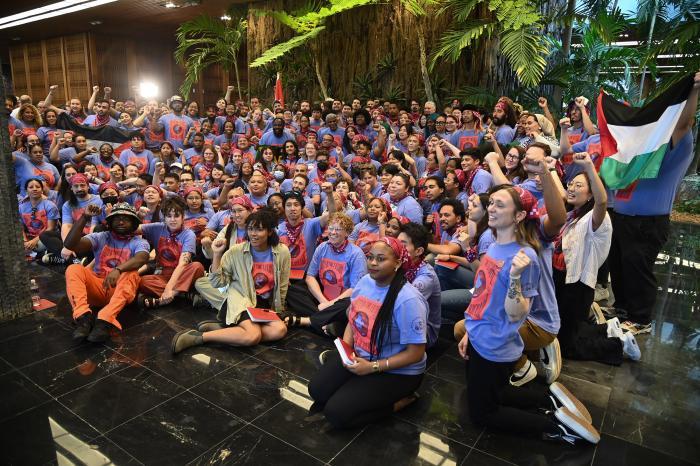
Hackwell commented on the irony by remarking on his experience in Cuba.
“What I have seen this past week is a government here more concerned about the well-being of the next generation of U.S. youth than their own government that marginalizes them by constricting access to jobs with a living wage, that makes access to education nearly impossible without the burden of student loans that they will carry for years, and that incarcerates them at a rate like no other country in the world.”
Manolo De Los Santos, executive director of the People’s Forum, thanked the Cuban people for their solidarity.
“These unfortunate incidents are further evidence of the wrong direction of a hostile U.S. foreign policy towards Cuba,” De Los Santos concluded in the tweet. “Their actions in fact demonstrate that the U.S. is far from a bastion of democracy and human rights, and rather than intimidate us, they motivate us to strengthen our struggles for true, transformative change here in the United States.”
🇨🇺✊🏽 After hours of harassment & interrogation, all the comrades who traveled to Cuba are FREE! Thanks for all the love & solidarity received from throughout the world!!
The aggressive attitude of the Customs & Border Patrol officials towards the members of our delegation during…
— Manolo De Los Santos (@manolo_realengo) May 4, 2023
Cuban President Miguel Díaz-Canel Bermúdez expressed his solidarity with the detained activists.
“Cheer up guys, we’re with you. Thank you for your courage, for supporting #Cuba and for facing the hatred of those who cannot stand the fact that the Cuban Revolution has the support of the most progressive youth in the very bowels of the beast. We send you a big hug.”
Ánimo, muchachos, estamos con ustedes. Gracias por la valentía, por apoyar a #Cuba y por enfrentar en las propias entrañas del monstruo el odio de quienes no pueden soportar que la Revolución Cubana tenga el apoyo de los jóvenes más progresistas. Les mandamos un fuerte abrazo. https://t.co/N6K2H92CaX
— Miguel Díaz-Canel Bermúdez (@DiazCanelB) May 4, 2023
U.S. Government Attacks Black Socialists
Meanwhile, the Hands Off Uhuru campaign announced via email to the press that on Tuesday, May 2, African People’s Socialist Party Chairman Omali Yeshitela and African People’s Solidarity Committee Chairwoman Penny Hess appeared in federal court in Tampa, Florida, in response to the U.S. Dept. of Justice’s April 18 indictment. The Black socialist group is accused of allegedly attempting to “sow discord” in the United States with the support of Russia.
Yeshitela, an 81-year-old Black man, and Hess, a white woman active in the movement since 1976, were “booked, restrained with handcuffs and leg irons, and held in a cell for several hours before appearing before a judge who released them on conditional bond that included a requirement to hand over their passports.
On Monday, May 8, Uhuru Solidarity Movement Chair Jesse Nevel will appear in response to the same indictment.
The group has asked the public to donate to the “Hands Off Uhuru! Hands Off Africa! Defense Fund” to help cover their legal fees.
Background information about this indictment can be found in a recent Toward Freedom article. If found guilty, the accused face up to 15 years in prison.
Julie Varughese is editor of Toward Freedom.
